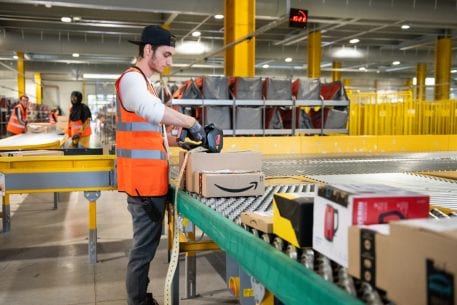Amazon Technologies Inc. is seeking to create supply chain trust with “verifiable tracking of an item through a supply chain using a distributed electronic ledger,” FreightWaves reported.
The company wrote in its United States patent application that it can be challenging, if not impossible, to ascertain the trustworthiness of a party as activities move online and internationally. It noted, “Trust is earned. Once trust is lost, it can often be difficult to regain.”
At the time that a product is brought into a product system, the filing notes, its information could be included in “the creation element” at the beginning of a ledger for that object. Additionally, the filing said a “certification authority” could be included to attest that the products received match up to the products in the catalog, based on one or multiple certification rules.
In the event that a certification rule is met, a record could be made to show transfer of the product from a provider to the catalog system. The company said the certification data could be “dynamically” shown with the product description data, as in the case of a response to catalog system inquiries.
In separate news, IBM and Chainyard, the blockchain consultancy, unveiled a supply chain management blockchain network called Trust Your Supplier, which aims to bolster supplier validation, life cycle data management and onboarding.
Managing suppliers typically involves manual processes, which makes it difficult to check identities and monitor documents, such as tax certifications. Trust Your Supplier is meant to save time and decrease the risk of errors and fraud by taking a decentralized approach and building a blockchain-based audit trail.
Gartner Inc., for its part, said blockchain is forecasted to support international movement and monitoring of $2 trillion of products and services yearly.



